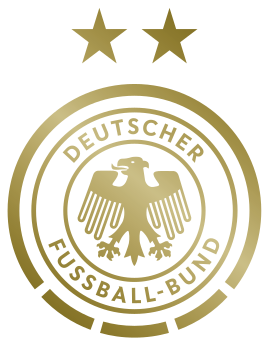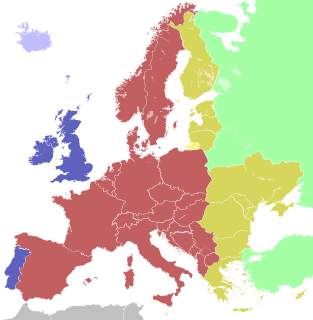This article details the 2010–11 UEFA Europa League qualifying phase and play-off round.
The 2015 FIFA Women's World Cup qualification UEFA Group 1 was a UEFA qualifying group for the 2015 FIFA Women's World Cup. The group comprised Croatia, Germany, Republic of Ireland, Russia, Slovakia and Slovenia.
The 2015 FIFA Women's World Cup qualification UEFA Group 6 was a UEFA qualifying group for the 2015 FIFA Women's World Cup. The group comprised Belarus, England, Montenegro, Turkey, Ukraine and Wales.
The UEFA Euro 2016 qualifying Group H was one of the nine groups to decide which teams would qualify for the UEFA Euro 2016 finals tournament. Group H consisted of six teams: Italy, Croatia, Norway, Bulgaria, Azerbaijan, and Malta, where they played against each other home-and-away in a round-robin format.
The UEFA Euro 2016 qualifying Group G was one of the nine groups to decide which teams would qualify for the UEFA Euro 2016 finals tournament. Group G consisted of six teams: Russia, Sweden, Austria, Montenegro, Moldova, and Liechtenstein, where they played against each other home-and-away in a round-robin format.
The 2014–15 UEFA Women's Champions League qualifying round was played on 9, 11 and 14 August 2014. A total of 32 teams competed in the qualifying round to decide 10 of the 32 places in the knockout phase of the 2014–15 UEFA Women's Champions League.
The 2015–16 UEFA Champions League qualifying phase and play-off round began on 30 June and ended on 26 August 2015. A total of 56 teams competed in the qualifying phase and play-off round to decide 10 of the 32 places in the group stage of the 2015–16 UEFA Champions League.
The 2015–16 UEFA Champions League group stage began on 15 September and ended on 9 December 2015. A total of 32 teams competed in the group stage to decide the 16 places in the knockout phase of the 2015–16 UEFA Champions League.
Group 7 of the 2017 UEFA European Under-21 Championship qualifying competition consists of six teams: Germany, Russia, Austria, Finland, Azerbaijan, and Faroe Islands. The composition of the nine groups in the qualifying group stage was decided by the draw held on 5 February 2015.
Group 4 of the 2017 UEFA European Under-21 Championship qualifying competition consists of six teams: Portugal, Israel, Greece, Hungary, Albania, and Liechtenstein. The composition of the nine groups in the qualifying group stage was decided by the draw held on 5 February 2015.
Group 6 of the UEFA Women's Euro 2017 qualifying competition consisted of five teams: Italy, Switzerland, Czech Republic, Northern Ireland, and Georgia. The composition of the eight groups in the qualifying group stage was decided by the draw held on 20 April 2015.
The 2015–16 UEFA Women's Champions League qualifying round was played on 11, 13 and 16 August 2015. A total of 32 teams competed in the qualifying round to decide eight of the 32 places in the knockout phase of the 2015–16 UEFA Women's Champions League.
The 2016–17 UEFA Women's Champions League qualifying round was played on 23, 25 and 28 August 2016. A total of 36 teams competed in the qualifying round to decide nine of the 32 places in the knockout phase of the 2016–17 UEFA Women's Champions League.
The 2018 UEFA Women's Under-17 Championship qualifying competition was a women's under-17 football competition that determined the seven teams joining the automatically qualified hosts Lithuania in the 2018 UEFA Women's Under-17 Championship final tournament.
This article is a compilation of FK Rossiyanka results at UEFA international women's football competitions. As of the beginning of 2017 the team holds a 27 - 7 - 14 record with a goal average of 141 - 56 in the UEFA Women's Cup and the UEFA Women's Champions League, and it has reached the competition's quarter-finals in three occasions.
Group 5 of the 2019 UEFA European Under-21 Championship qualifying competition consists of six teams: Germany, Israel, Norway, Republic of Ireland, Azerbaijan, and Kosovo. The composition of the nine groups in the qualifying group stage was decided by the draw held on 26 January 2017, with the teams seeded according to their coefficient ranking.
Group 9 of the 2019 UEFA European Under-21 Championship qualifying competition consists of six teams: France, Slovenia, Montenegro, Bulgaria, Kazakhstan, and Luxembourg. The composition of the nine groups in the qualifying group stage was decided by the draw held on 26 January 2017, with the teams seeded according to their coefficient ranking.
UEFA Group 4 of the 2019 FIFA Women's World Cup qualification competition consisted of five teams: Sweden, Denmark, Ukraine, Hungary, and Croatia. The composition of the seven groups in the qualifying group stage was decided by the draw held on 25 April 2017, with the teams seeded according to their coefficient ranking.
The 2017–18 UEFA Women's Champions League qualifying round was played between 22 and 28 August 2017. A total of 40 teams competed in the qualifying round to decide 11 of the 32 places in the knockout phase of the 2017–18 UEFA Women's Champions League.
The 2019 UEFA Women's Under-17 Championship qualifying competition is a women's under-17 football competition that will determine the seven teams joining the automatically qualified hosts Bulgaria in the 2019 UEFA Women's Under-17 Championship final tournament.









